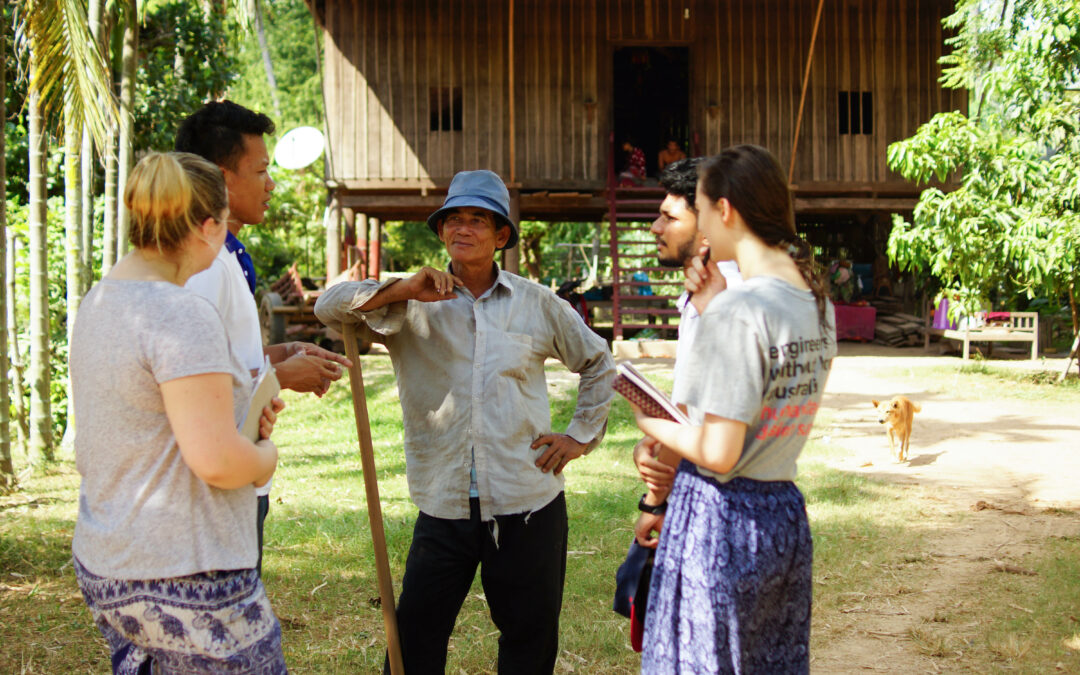The BeLongEng research project will help the sector understand how experiences in humanitarian engineering shape careers and opportunities in the long-term.
Unique opportunity to influence the future of engineering education and policy
EWB Australia is pleased to announce recruitment for the unique BeLongEng Project has begun! We invite you to sign-up to help support this important research.
The BeLongEng Project is a world-first longitudinal study on engineers and engineering careers, run by a coalition of great universities EWB has been proud to partner with including The University of Canterbury, The University of Auckland, University Technology Sydney, Queensland University of Technology and The University of Western Australia.
The research will run from 2022-2042 with participants taking surveys in 2022, 2023, 2025, 2027, 2029, 2032, 2037 and 2042. The resulting data will paint an incredibly rich picture of diversity on the careers of engineers from Australia and Aotearoa New Zealand, as well as information on how engineering roles and skills shift over time.
EWB Australia’s role
EWB Australia is excited to be a peak body partner of the BeLongEng Project. We believe this research will help shape the future of engineering. EWB has been running education programs and pushing for changes to the global Graduate Attributes and Professional Competencies as we see the potential for engineers to help lead sustainable development in every context, including Australia and Aotearoa New Zealand.
The recent updates to the competencies and discourse at events such as the EA Climate Smart Engineering Conference tells us that the understanding of the role of engineers is evolving. We believe there is an increasing desire in the sector to be more present in policy development in relation to sustainable development, as well as a desire to make engineering processes and outcomes more inclusive and sustainable. We believe that new skills, many of which are already associated with humanitarian engineering, will help drive the transition for engineers to embrace their role as a socio-technical professional.
This research will help determine if the role of engineering changes over time; how the skills change, how they don’t and where the gaps are. This data will also help us understand how EWB can support the sector to transition in key areas, drawing on our extensive experience in building a diverse skill set in engineering students and professionals, which complements their core technical skills.
The research also captures humanitarian engineering as a discipline to track those who identify as humanitarian engineers. This will make it possible to see how the careers of those engineers progress, including their sense of belonging to the profession, the different fields they work in and their work locations. There are also some great questions at the global humanitarian engineering scale. Given this, participation in the BeLongEng research project from participants who have previously been involved in EWB’s programs and placements will be highly valuable.
Making research inclusive and respectful
EWB and our partners are focussed on ensuring research is ethical and the benefits of research are shared equitably. Historically, this has not always been the case, with some groups benefiting far more than others. In particular, research with First Nations Peoples has been characterised by misrepresentation, bias, theft and inappropriate use of data.
The BeLongEng research project has been designed with all this in mind; Indigenous data rights was a critical consideration throughout the broader ethics process. The research was designed with the principle of Kaitiakitanga at its core. Kaitiakitanga is a Māori concept relating to guardianship and protection which has been embedded in the research design to ensure justice in both the guardianship of participants’ data, and how this is handled and reported. The project has been approved by the University of Canterbury’s Human Research Ethics Committee (HREC 2021/157).
How to get involved
You can sign up today to support this critical and impactful research. Applications for participation close Friday 10 June 2022.
To be eligible, you must be an engineer from Australia or Aotearoa New Zealand. This means you either need a 2-, 3-, 4- or postgraduate engineering qualification from Australia or Aotearoa New Zealand, and/or be recognised by Engineers Australia or Aotearoa New Zealand as an engineer. You also need to be expecting to work as an engineer for at least the next 10 years.
By participating in this research, you will help shape the future of engineering and help organisations like EWB Australia understand how to support the engineering sector in Australia and Aotearoa New Zealand, as we work towards global sustainable development.
Applications are now closed.


